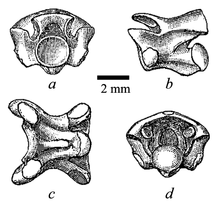Coniophis
Coniophis is an extinct genus of snakes from the late Cretaceous period. The only species sure to belong to this genus, Coniophis precedes, was about 7 cm long and had snake-like teeth and body form, with a skull and a largely lizard-like bone structure. It probably ate small vertebrates. The fossil remains of Coniophis were first discovered at the end of the 19th century in the Lance Formation of the US state of Wyoming, and were described in 1892 by Othniel Charles Marsh. For the genus Coniophis, a number of other species have been described. Their affiliation is, however, poorly secured, mostly based on vertebrae descriptions from only a few fossils.
| Coniophis | |
|---|---|
 | |
| Holotype vertebra of Coniophis precedens | |
| Scientific classification | |
| Kingdom: | Animalia |
| Phylum: | Chordata |
| Class: | Reptilia |
| Order: | Squamata |
| Suborder: | Serpentes |
| Infraorder: | Alethinophidia |
| Genus: | †Coniophis Marsh 1892 |
| Species | |
Fossil distribution
Fossils of Coniophis have been found in:[2]
- Cretaceous
- Milk River and Frenchman Formations, Canada (Alberta, Saskatchewan)
- Intertrappean Beds, India
- Wadi Milk Formation, Sudan
- United States
- Hell Creek Formation, Montana
- Fruitland Formation, New Mexico
- Naturita, Cedar Mountain, Straight Cliffs, Kaiparowits and Wahweap Formations, Utah
- Lance Formation, Wyoming
- Paleocene
- Santa Lucía Formation (Tiupampan), Bolivia
- Jbel Guersif Formation, Morocco
- Fort Union Formation, Montana, United States
- Eocene
- Itaboraí Formation, Brazil
- France
- Ait Ouarhitane Formation, Morocco
- United States
- Chadron Formation, North Dakota
- Bridger, Wagon Bed and Wasatch Formations, Wyoming
References
- Coniophis Marsh, 1892 in GBIF Secretariat (2017). GBIF Backbone Taxonomy. Checklist Dataset https://doi.org/10.15468/39omei accessed via GBIF.org on 2018-04-06.
- "Coniophis". Fossilworks. Retrieved 6 April 2018.
Further reading
- Adriana María Albino: Las serpientes de São José de Itaboraí (Edad Itaboraiense, Paleoceno medio), Brazil. In: Ameghiniana 27, 1991. S. 337–342.
- Sebastián Apesteguía, Hussam Zaher: A Cretaceous Terrestrial Snake with Robust Hindlimbs and a Sacrum. In: Nature 440, 2006. doi:10.1038/nature04413, S. 1037–1040.
- Judy Gail Armstrong-Ziegler: An Aniliid Snake and Associated Vertebrates from the Campanian of New Mexico. In: Journal of Paleontology 52 (2), 1978. S. 480–483.
- Marc Augé, Jean-Claude Rage: Herpetofaunas from the Upper Paleocene and Lower Eocene of Morocco. In: Annales de Paléontologie 92, 2006. doi:10.1016/j.annpal.2005.09.001, S. 235–253.
- Richard Estes: Middle Paleocene lower vertebrates from the Tongue River Formation, Southeastern Montana.In: Journal of Paleontology 50, 1976. S. 500–520.
- Richard C. Fox: Fossil Snakes from the Upper Milk River Formation (Upper Cretaceous), Alberta. In: Canadian Journal of Earth Sciences 12, 1975. S. 1557–1563.
- James D. Gardner, Richard L. Cifelli: A Primitive Snake from the Cretaceous of Utah. In: David M. Unwin: Cretaceous Fossil Vertebrates. Special Papers in Palaeontology 60, 1999. S. 87–100.
- Robert Hoffstetter: Squamates de Type Moderne. In: Jean Piveteau: Traité de Paléontologie. Tome V. Masson, Paris 1955. S. 606–662
- J. Alan Holman: Fossil Snakes of North America. origin, Evolution, Distribution, Paleoecology. Indiana University Press, Bloomington 2000. ISBN 0-253-33721-6.
- Nicholas R. Longrich, Bhart-Anjan S. Bhullar, Jacques A. Gauthier: A Transitional Snake from the Late Cretaceous Period of North America. In: Nature, 2012. doi:10.1038/nature11227, S. 1–4.
- Nicholas R. Longrich, Bhart-Anjan S. Bhullar, Jacques A. Gauthier: Supplementary Material. In: Nature, 2012. doi:10.1038/nature11227, S. 1–10.
- Othniel Charles Marsh: Notice of New Reptiles from the Laramie Formation. In: American Journal of Science, Series 3 43, 1892. S. 449–453.
- Paul Orman McGrew, Max K. Hecht, John M. Hummel, George Gaylord Simpson, Albert Elmer Wood: The Geology and Paleontology of the Elk Mountain and Tabernacle Butte Area, Wyoming. In: Bulletin of the American Museum of Natural History 117, 1959. S. 117–176. (Volltext)
- Jean-Claude Rage: Le Gisement du Bretou (Phosphorites du Quercy, Tarn‐et‐Garonne, France) et Sa Faune de Vertebres de l'Eocene Superieur. In: Palaeontographica Abteilung A 25, 1988. S. 3–27.
- Jean-Claude Rage, C. Werner: Mid‐Cretaceous (Cenomanian) Snakes from Wadi Abu Hashim, Sudan: The Earliest Snake Assemblage. In: Palaeontologia Africana 35, 1999. S. 85–110.
- Jean-Claude Rage, Guntupalli V.R. Prasad, Sunil Bajpai: Additional Snakes from the Uppermost Cretaceous (Maastrichtian) of India. In: Cretaceous Research 25, 2004. doi:10.1016/j.cretres.2004.02.003, S. 425–434.
- Jean-Claude Rage, Marc Augé: Squamate Reptiles from the Middle Eocene of Lissieu (France). A Landmark in the Middle Eocene of Europe. In: Geobios 42, 2010. doi:10.1016/j.geobios.2009.08.002, 253–268.
This article is issued from Wikipedia. The text is licensed under Creative Commons - Attribution - Sharealike. Additional terms may apply for the media files.